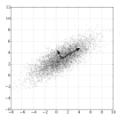This paper studies kernel PCA in a decentralized setting, where data are distributively observed with full features in local nodes and a fusion center is prohibited. Compared with linear PCA, the use of kernel brings challenges to the design of decentralized consensus optimization: the local projection directions are data-dependent. As a result, the consensus constraint in distributed linear PCA is no longer valid. To overcome this problem, we propose a projection consensus constraint and obtain an effective decentralized consensus framework, where local solutions are expected to be the projection of the global solution on the column space of local dataset. We also derive a fully non-parametric, fast and convergent algorithm based on alternative direction method of multiplier, of which each iteration is analytic and communication-effcient. Experiments on a truly parallel architecture are conducted on real-world data, showing that the proposed decentralized algorithm is effective to utilize information of other nodes and takes great advantages in running time over the central kernel PCA.
翻译:与线性五氯苯甲醚相比,内核的使用对分散式共识优化的设计提出了挑战:当地预测方向取决于数据。因此,分布式线性五氯苯甲醚的共识限制不再有效。为了克服这一问题,我们提议了一个预测性共识限制,并获得一个有效的分散式共识框架,其中当地解决方案预计将是将全球解决方案投放到本地数据集的柱体空间上。我们还根据其他非参数、快速和趋同式算法得出一个完全非参数、快速和集中式的算法,其基础是其他的倍增效法,其中每种迭代都是分析性和通信高效的。关于真正平行结构的实验是在现实世界数据上进行的,表明拟议的分散式算法能够有效地利用其他节点的信息,并且在运行中央内核五氯苯甲醚的时间方面有很大的优势。



